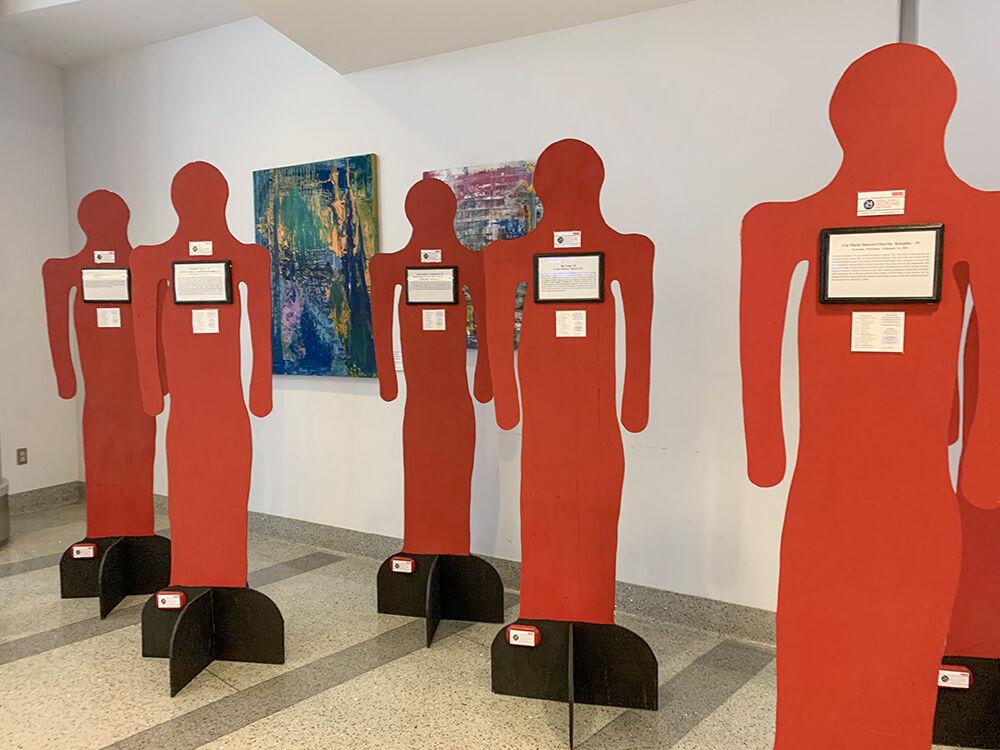Editor’s Note: This article contains reference to domestic violence.
When walking through Talley Student Union, students, faculty and guests alike will find a powerful exhibit on display for personal reflection. Situated beyond Talley Market, several red silhouette cutouts stand with names and faces that become known by those who choose to stop and read more. What people find are the stories of individuals who lost their lives from the dangerous relationships that they were in — victims of domestic violence.
The Silent Witness Project is an international effort that places exhibits throughout the country, allowing people to remember the names of victims and helping promote further efforts to end domestic violence. The project was created in 1990 and has been implemented at NC State as a month-long memorial for many years.
Grace Woods, a fourth-year studying social work and intern for the Women’s Center, helped to set up the project. According to Woods, this passive exhibit brings awareness in a subtle, yet powerful, way.
“It’s just sort of an active remembrance and a way for people to remember as a community,” Woods said. “The Silent Witness Project is an interactive way for the victims to visibly be seen and for people to just see it in their daily life.”
Considering the impact this project may have on people, certain changes have been implemented to not only create a more personal experience, but to remind students that there are resources available through the Women’s Center and on campus for support. One of these changes includes a resource table.
“For more long-term support, we usually refer to the Counseling Center, IPV counselors,” Woods said. “We can also provide funding, a dedicated survivor fund. If you need funding for housing, we do have an emergency housing fund. And we can get you to your legal appointments and stuff like that too, and just sort of walk you through that process if you decide to take action.”
Dr. Kaelie Giffel, Assistant Director for Interpersonal Violence (IPV) Prevention Education and Training, organized the exhibit this year. One of the changes she implemented was including pictures and other additional information to reveal more about each person.
“On our side of the statues, we have a variety of stories,” Giffel said. “But I’ve also included pictures of the victims, some who are women, some who are trans women, some who are trans men, and kind of across racial experiences. I wanted to find a variety of experiences to show folks that IPV affects almost every community. And so this is like a huge, huge effort. It’s not something that belongs just to one group. It’s not something that only affects certain people — it affects all of us.”
In consideration of the adjustments made this year, Giffel reflects on future changes that may be added to improve the exhibit further, including the importance of talking about the experiences and emotions people may have as they walk through the stories.
“I think that it is important to have community conversation,” Giffel said. “It’s one thing to experience Silent Witness on your own, because it is a deeply troubling exhibit. But then it’s a whole other thing, if, for instance, you took a group tour through it, and then you had kind of an organic conversation with somebody. This is why I think that it’s good as a passive exhibit.”
With such an honest display of a difficult subject, there can be negative impacts as well. Giffel describes how raising awareness and making people comfortable enough to talk to others can help alleviate these hard-to-confront feelings.
“We also need to have follow-up conversations with people,” Giffel said. “What do you do with that kind of knowledge? And how do I make sure that doesn’t lead you to despair? … I think it [the project] gives students an ability to engage something on their own terms and in their own time. But I do think that maybe we should add a community conversation piece to help contextualize information and help them think about what things I can do around the issue, [and the] community.”
Beyond the resources previously mentioned, the Women’s Center, as well as the Sexual Assault helpline, can be contacted directly. And although it’s titled the Women’s Center, it’s important to remember that the support offered is catered to everyone.
If you or someone you know is experiencing relationship violence, sexual violence, stalking or any other form of interpersonal violence and are in need of advocacy services, the NC State Women’s Center has trained advocates available to offer crisis intervention, emotional support, resources, and referrals. Students can contact the 24/7 Sexual Assault Helpline at 919-515-4444 or email ncsuadvocate@ncsu.edu to schedule an appointment with an advocate.
Advocacy services through the NC State Women’s Center are available for all students inclusive of all gender identities and sexual orientations.
**For more information on advocacy services, please visit go.ncsu.edu/supportsurvivors. If you would like to talk to a confidential resource, you can also connect with the NC State Counseling Center at 919-515-2423. You may also visit go.ncsu.edu/safe for additional information on resources and reporting options.**














